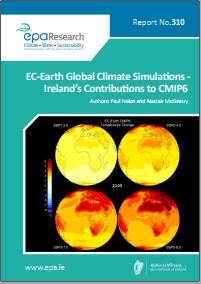Research 310: EC-Earth Global Climate Simulations: Ireland’s Contributions to CMIP6
Authors: Paul Nolan and Alastair McKinstry
Summary: This report provides an overview of future global climate projections as simulated by the EC-Earth Earth system model. The global climate simulations described in this report constitute Ireland’s contribution to the Coupled Model Intercomparison Project (CMIP) (phase 6) (CMIP6) and will be included for assessment in the United Nations Intergovernmental Panel on Climate Change (IPCC) Sixth Assessment Report (AR6)

EC-Earth Global Climate Simulations: Ireland’s Contributions to CMIP6 PART 1
EC-Earth Global Climate Simulations: Ireland’s Contributions to CMIP6 PART 2
EC-Earth Global Climate Simulations: Ireland’s Contributions to CMIP6 PART 3
Research Report 310 :: Environmental Protection Agency, Ireland
Identifying Pressures:
Informing Policy:
Developing Solutions:
https://www.epa.ie/media/epa-2020/publications/research/Thumbnail_research310[1].jpg